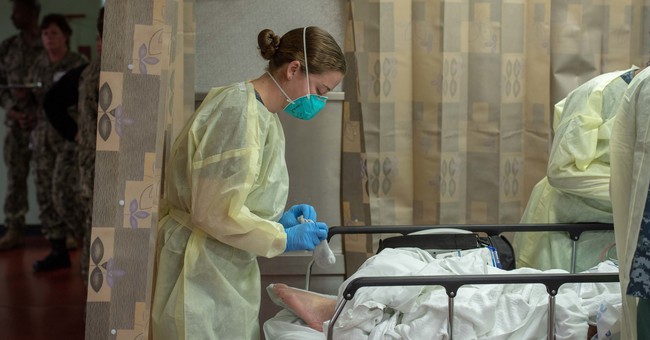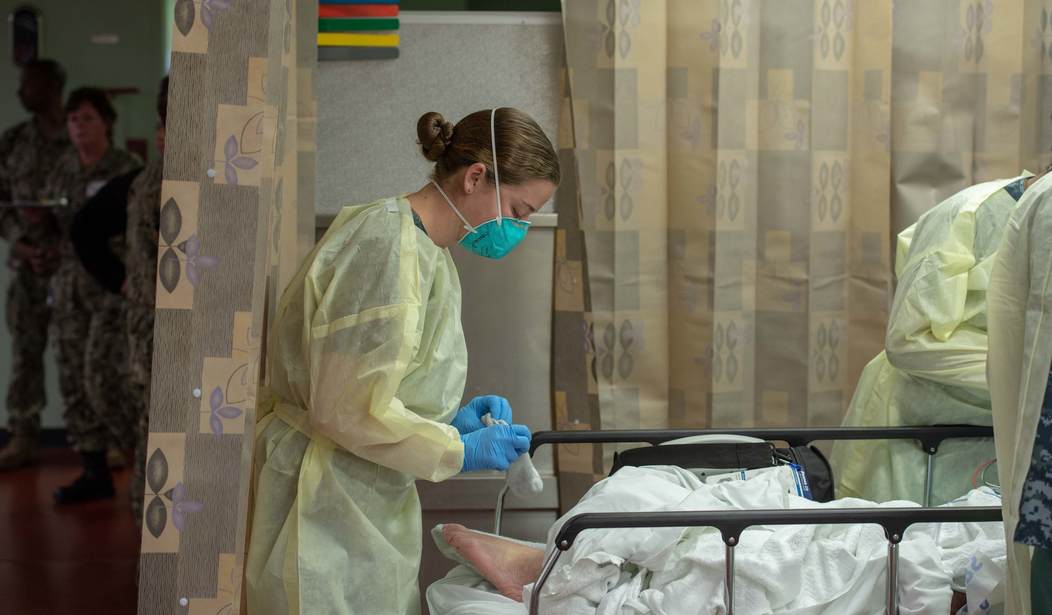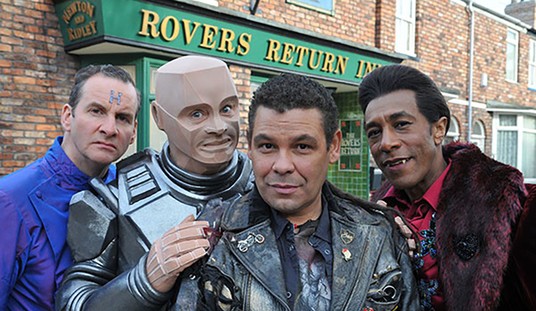
LOS ANGELES (March 29, 2020) Sailors assigned to the hospital ship USNS Mercy (T-AH 19) treat a patient from Los Angeles medical facilities March 29. Mercy deployed in support of the nation’s COVID-19 response efforts, and will serve as a referral hospital for non-COVID-19 patients currently admitted to shore-based hospitals. This allows shore base hospitals to focus their efforts on COVID-19 cases. One of the Department of Defense’s missions is Defense Support of Civil Authorities. DoD is supporting the Federal Emergency Management Agency, the lead federal agency, as well as state, local and public health authorities in helping protect the health and safety of the American people. (U.S. Navy photo by Mass Communication Specialist 2nd Class Erwin Jacob Miciano)
On January 15, a 35-year-old man returned to Seattle, Washington after visiting his family in Wuhan, China. Five days later, on January 20, he became the first person in the U.S. to test positive for the coronavirus.
In a new development, data from the Centers for Disease Control and Prevention (CDC) indicates that the virus may have actually arrived in California in December.
The Los Angeles Times reports that on Friday, Santa Clara County executive officer and physician Jeff Smith told city leaders, “The virus was freewheeling in our community and probably has been here for quite some time.”
He said the “CDC and local health authorities have collected data that suggest the virus may very well have been present as early as December 2019.”
Smith added, “This wasn’t recognized because we were having a severe flu season. Symptoms are very much like the flu. If you got a mild case of COVID-19, you didn’t really notice. You didn’t even go to the doctor. The doctor maybe didn’t even do it because they presumed it was the flu…It may very well be that some of these cases had been COVID-19.”
The Times points out, “just as New York has strong ties to travelers from Europe, who are believed to have brought the coronavirus there from Italy, the Bay Area is a natural hub for those traveling to and from China.”
Obviously, the first individual to test positive in the U.S. wasn’t the only person to visit relatives back in China over the holidays and return. Many people were likely exposed to the virus in Wuhan before returning.
Very recently, I began to suspect that the disease may have been around longer than had previously been thought. An email from a reader, whom I thought at first was crazy, followed by a text message from a friend changed my mind. I wrote a post about it and I asked readers to contact me if any of them believe they may have had an early, undiagnosed case of COVID-19. I received far more responses than I’d been expecting.
The reader who sent that first email is a teacher and he is convinced that he and many of his colleagues had the coronavirus in February. He said so many students were sick that several nearby school districts closed. At first, they thought it was the flu, but those who went to the doctor tested negative for the flu. In fact, he had had a flu shot. The symptoms were consistent with COVID-19.
A friend of mine works in a large town hall in a suburb of a large city. This city is home to a prestigious university that is affiliated with a well-known area hospital.
He estimates that 33% of the residents in his town are Asian. Many of them are affiliated with this university. They are undergraduates, graduate students, faculty. Others are doctors, nurses, residents, and administrators with the hospital.
In December, many of them went back to China, Korea, and a host of other countries for Christmas break. They returned in mid-January for the resumption of classes, sharing planes, airports, buses, and restaurants.
He writes:
By the second week of February, my public building got hit with a strange illness that hit more than half of the staff. Most had mild to moderate symptoms, with the weird complaints ranging from slight, chronic headaches to fatigue to exhaustion. I myself felt woozie, dizzy, tightness in my chest. light-headedness, and thought I was going to faint every time I stood up.
I left work one day during the third week of February and went to my doctor. All he could find was an elevated temp of 99.5 and a slight abnormality in my EKG readings. He knew there was something wrong with me, but couldn’t figure it out.
If it was the flu, it didn’t feel like any flu I had ever had! I didn’t have a raging fever, no sweats or chills, or any other typical flu-like symptoms.
I also thought it strange that I was sent home with not only an antibiotic, but with an antiviral as well. I don’t think I’d ever been given both at the same time.
Many of us believe we were infected back in February.
As I mentioned above, I received many emails from readers who believe they’d had an early case of COVID-19. Most of the stories contained some version of my friend’s comment, “If it was the flu, it didn’t feel like any flu I had ever had!” Another commonality was, “I was tested for the flu and it was negative.”
I’d like to share a few of these accounts:
Southern California, A Dozen Friends/Colleagues, End of December, Most Travel Frequently for Work:
I live in Southern California. At least a dozen friends/colleagues experienced a strange “flu” that kicked-in in December, and peaked in the week between Christmas and New Year’s.
With the exception of my significant other, we are all reasonably healthy men in our 40s-60s. My significant other, with whom I have lived for six years, also had these symptoms, and did so for the same period of time, about 5-9 days, with a peak of about three days. She is in her mid-40s.
These symptoms were very similar to what we’re hearing now: fever, deep, hard cough that lingers, bit of a headache, being more tired than usual… Most of us travel quite a bit for work: we meet in groups; lot of time in airports: conditions ripe for transmission.
None of us typically discuss our minor heath issues with each other, but this “flu” was unique enough that it generated enthusiastic discussion when someone mentioned they we’re feeling a bit “off” during this time.
We have all recovered for the most part, with a few of us still harboring a lingering cough.
College Student, Attends University with Large Asian Population, Many in Dorm Were Sick as Well:
My Arizona State Univ freshman son came down with all the symptoms early February. He went to the campus health clinic twice and an urgent care. He had extreme symptoms, was tested for flu, mono and strep. All were neg. Health care officials told him there was a respiratory virus going around campus and what to expect. He transitioned from fever to aches to lethargy to cough to bronchitis. They treated him eventually with an albuterol breathing treatment and gave him an emergency inhaler to use as needed. Many in his dorm experienced the same. Oddly, he mentioned several of his frat brothers had come down with pinkeye. A condition we later found out to be a symptom.
Not unsurprisingly there are many Asian students at ASU. I’m sure a large majority went home for Christmas break only to bring the Chinese virus home to my state.
My son came home for spring break where my RN wife put him to bed and gave him some prednisone we had on hand to help his breathing. He was back up and running a couple days later and has been fine since.
My wife and I (we’re both in our mid 50’s) both developed a low grade fever, cough and tiredness. Didn’t think much of it and it passed.
If we kept those most susceptible to infection away from the populace and let the rest of us get on with our lives and come into contact with this virus we’d get over this quicker and build and immunity to when it recurs next time.
Man who Rides City Bus with Many Foreigners, Tested Negative For Flu:
We were extremely ill the first and second week of Feb with what we thought was the flu. But now, we are wondering if we had the Corona virus.
My husband was the first to become sick. He didn’t feel well at all one Monday after work. He rides the public bus downtown (to avoid sitting in traffic and paying parking fees) and rides with many people from other countries. By the next day, he was running 103.8 temp and was weak and had flu like symptoms. He went to the doctor and tested negative for strain A & B of the flu. The Dr said there are many strains of the flu and even if not A or B positive, he was sure it was some strain of the flu and gave him Tamiflu. On Wednesday, he could hardly walk and was extremely fatigued. He had a dry cough but no nasal symptoms. He ran nearly 104 temp almost 4 days. I had to take care of him as he was too weak. Then on Thurs, I started not feeling well. By Fri, I was running 102.8 temp and had all of the same symptoms. Thankfully, he got some of his strength back by Sat because now, he had to help me. I called my Dr Fri and she called in Tamiflu for me as well without any test since I’d clearly been exposed. I never run fever unless extremely ill and I had close to 103 temp till Monday. All we could do was lay around and sleep most of the time. By Tues, I started having a heavy chest and felt like the infection was moving into my chest. I was afraid I was getting walking pneumonia, which I’ve had before. I have a nebulizer from before and I started using it. After 3 or 4 days on the nebulizer, I started getting better. But, it took yet another week for us to get our full strength back and my cough lasted another two weeks after that.
This was the sickest we’ve been in years. Due to the timing of when we were sick, we think we had the virus. We are anxiously awaiting availability of the test to see if we have the antibodies so we’ll know if we had it. If we did, we are hoping to help others by giving blood.
Couple, 60s, 70s, Traveled on Tourist Bus, Visited Cape Canaveral with Tourists from All Over the World
Strongly believe my boyfriend and maybe me had the corona virus. He got sick just after January 15. I got sick on February 5. We were in Florida together from January 7-15. He Flew back to Boston on the 15 and felt sick shortly thereafter. He was sick for over five weeks. He had a lot of the symptoms including dry cough, exhaustion, fever, and others. He is 76 and a veteran. He went to the VA and they could not identify his illness. At one point he was so sick, picking up a sandwich at a local shop and called 911 himself. He is not a guy who would normally do that. He was taken to Mt. Auburn Hospital in Cambridge, MA. They could not figure it out except for something respiratory.
I stayed in FL until February 7. That morning I felt sick with a cough. After I flew back to MA I got sicker. I was it as serious as my boyfriend, but had cough, and felt just crappy. I was that way for about four weeks. I may not have had the virus, but I am pretty convinced that my boyfriend did.
While in Florida we went to Key West and rode those open air busses all over the place for two days. We were with a lot of tourists on those busses and a ship was in port.
We spent another day at Cape Canaveral with lots more tourists from all over the world, touching all of the exhibits such as simulators and sitting in auditoriums watching shows.
I would like to know if he and I have antibodies.
Earliest case, Lives in a Very International, Multicultural Community
I am writing in reference to your article today about COVID19 having already been circulating for quite a while. My wife back in the middle of December suffered what she referred to a flu like no other she had ever experienced. It only lasted four days, but during that time she had a dry cough, felt like she had an elephant sitting on her chest and even lost the sense of taste and smell for 48 hours. She didn’t have a high temperature but she is strange that way, she tends to have an unusual drop in temperature when she gets really sick which also happened in this case.
She was not the only one I heard of experiencing a weird flu around the Christmas holidays, so the two of us have wondered since this thing started weather it has been around much longer than people think.
In response to my questions:
My wife only traveled to New Orleans back in October 2019 for her annual meeting but no international travel.
However, we live in Northern Virginia right outside of Washington DC in a community that is very international and multicultural with numerous people who work in the local software industry, embassies and attend and work/teach at some of the universities in DC and Northern Virginia so it’s very possible that she could have come in contact with someone who had it.
And yes, it most definitely was unlike any flu she had ever experienced (she distinctly remembers being exhausted and out of breath just coming up the stairs from our basement).
As we read and find out more info my wife and I are more and more convinced that the US is experiencing a second wave of this thing. The first one milder arriving in November/December and the second more virulent which arrived in late January/early February. My wife has requested to be tested for antibodies so I will keep you posted if that happens.
Couple, Both 65, Spent First Three Weeks in Orlando:
My wife and I were in the Orlando area with a condo for the month of January. We are both 65 and retired and both very active and healthy. She came down with a bad cough and fever and was just miserable. It hurt her chest so much to cough. We decided to head home 8 days early, right about January 24. We (I) drove 16 hours back to OH. Three days later I came down with it as well. I remember one evening when I was feeling so bad I wondered if I had pneumonia and got a little scared. All I know is that this illness seemed different with the headaches, and degree of cough and chest pain while coughing. It took quite a while but I eventually returned to health. We both believe that based on the uniqueness and severity we experienced, we might have had COVID-19. But at this time there is no way for us to know for sure.
Numerous similar accounts have been appearing on social media. But Dr. Smith’s remarks to Santa Clara city officials is the closest we’ve come to validating these accounts. The article in The Times says that researchers, trying to determine when the first cases occurred “are now turning to blood banks and other repositories to see if lingering antibodies can show them what was missed. A study funded by the National Institutes of Health is looking for virus antibodies in samples from blood banks in Los Angeles, San Francisco and four other cities across the country.”
An easier way to determine when COVID-19 began to spread in the U.S. would be for those who believe they had it, to take the antibody test. I’m sure many people are anxious to do so.














Join the conversation as a VIP Member